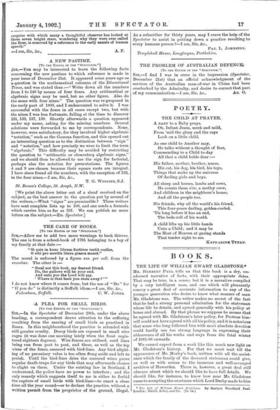BOOKS.
THE LIFE OF WILLIAM EWART GLADSTONE, MR. HERBERT PAUL tells us that this book is a dry, un- adorned narrative of facts, with their appropriate dates. That may be true, in a sense ; but it is a narrative compiled by a very intelligent man, and one which will pleasantly convey a great deal of accurate information to any of the younger generation who desire to know what manner of man Mr. Gladstone was. The writer makes no secret of the fact that he had a strong personal admiration for the statesman whose life he details, and agreed generally with his policy at home and abroad. By that phrase we suppose he means that he agreed with Mr. Gladstone's later policy, for Proteus him- self could not have agreed with all his policy, and it is notorious that some who long followed him with most absolute devotion could hardly use too strong language in expressing their abhorrence of all his works and ways from the fatal winter of 1885-86 onwards.
We cannot expect from a work like this much new light on Mr. Gladstone's history. For that we must wait till the appearance of Mr. Morley's book, written with all the assist- ance which the family of the deceased statesman could give, as well as with access to the immense and well-arranged archives of Hawarden. There is, however, a great deal still obscure about which we should like to have full details. We should like, for instance, to know how near Mr. Gladstone came to accepting the overtures which Lord Derby made to him • The Life of William Ewart Gladstone. B. Herbert Woodfield Pout London : Smith, Elder, and Co. [7e. 611
. in 1858. We wonder whether he would have accepted them if there had been no Disraeli already in the field. It has been frequently said, and Mr. Paul evidently believes, that Disraeli backed the representations of his chief.
We should be glad, too, to know what was Gladstone's conduct as a member of Lord Palmerston's last Cabinet. One account would have it that ho was so troublesome that the Prime Minister declared that he would die in a madhouse ; while one of his colleagues, taking a less grave view of the subject, said to George Venables : "I never hear Gladstone bothering on as he does in Cabinet without being inclined to say to him : Now you just go and stand up in the corner till you are good." Yet this was the period of some of his purest triumphs,—of his great speech on Italy at Easter, 1862, and of his even greater speech on the taxation of charities, which marks, we think, the highest point to which his Parlia- mentary eloquence ever attained.
We should be inclined to believe that the historian of the nineteenth century will hold that Gladstone's great time lay between the spring of 1867 and that of 1874. He had com- mitted one great blunder in 1866, when he was a party to the introduction of the quite harmless Reform Bill of that year at an ideally infelicitous moment, bringing about thereby the Adullamite Secession, and the fall of Lord Russell's Govern- ment. He was only, saved from another tactical blunder in 1867 by the protest of a section of his own party, which made him very angry at the time, but the wisdom of which sub- sequent events made clear to all eyes. From that time for- ward, alike in opposition through 1867-68 and in the five years of his first Administration, he was most admirable. He never was a Liberal, but through all those years he led the Liberals as if he had been one of themselves, and infinitely better than any one of them could have done. He could not, however, escape his destiny. Cornewall Lewis, shortly before he died in April, 1863, said :—" Palmerston is near his end, but, after him, Gladstone is inevitable, and in five years he will have smashed the party to atoms." Cornewall Lewis was a prophet; he looked through eleven years as through clear water.
No passage in Mr. Gladstone's life before the great betrayal wants more clearing up than the Dissolution of 1874. It will be interesting to see if Mr. Morley will be able to put his conduct in that matter in a more favourable light. Before the publication of Lord Selborne's Memoirs, it seemed to be merely a piece of sudden folly ; but that, unhappily, is far from being the case now, and until we receive some further light we' must believe that the difficulties about his own seat were the determining motive. The idea which prevailed amongst the persons most concerned when his too famous address appeared was that he had taken his measures, and had been able to calculate on coming back for certain with a smaller but more compact majority. A little later it was rumoured that he had taken nobody into his confidence save Lord Granville and Lord Wolverton. The first was a shrewd man of the world, but not so placed as to know much about the constituencies; the second ought, up to a tolerably recent date, to have known everything about them, but his attitude towards his chief was such that a pet spaniel would have been just as good an adviser. The faithful creature, called into council, would have put its paws on its master's knees, looked into his face, wagged its tail, and perhaps barked, but to have expected much dry light from it would have been unreasonable. A certain amount of resistance is indispensable in a support. When the proposal came to the Cabinet, there seems to be no doubt that that august conclave was swept away by Gladstone's impetuous energy. Stansfeld, we believe, was the only man who had the wisdom and courage to withstand the torrent. This is very likely to be true, for undoubtedly the, suggestion of a Dissolution came like an electric shock. We can only speak with absolute certainty of one of its most important members, but should be much surprised if the statement we make was sot true of many.
Mr. Paul devotes several pages to Mr. Gladstone's Homeric ' vagaries, which he estimates at their true value, but he does not point out that they injured their author very much in the opinion of many impartial persons. "Mr. Gladstone," said a fatious foreign man of letters to the writer, " may be a very great statesman ; I cannot form an opinion about that ; but I feel great distrust of any one who writes such outrageous nonsense about things which I do understand." In any case, thelHomeric studies gave occasion for' a very'witty if cynical remark, to the effect that the true object of all his Homeric labours was to induce Mrs. Gladstone to call npon 'Helen 1. Closely connected with his views about Homer were those religious ideas which Inronglit him frequently into collision with some of his natural allies; especially during the " sixties." When one of 'them had occasion to see him with reference to the 'perseeution of Mr:lowett, in which the intolerant and unintelligent at one time indulged, he admitted that to give the heretic only £40 for being Professor of 'Greek at Oxferd was not the-proper way' to defend the faith. He 'added, hothaer : " jowett has' done enormous 'mischief," throwing an ea-Aphasia upon the word
enormous " which would have been 'at least adequate if all the powers of evil had been concentrated in the breast of the quiet little Tutor of B01(1 To say that Gladstone was a great Prime Minister, in the sense in which that title belonged to Peel, would not be true. His attention to foreign affairs, as even Mr. Paul admits, was fitful, and, we may venture to add, frequently maladroit. About India he knew nothing and cared less ; while ialtheeigh not in any way desiring to restore the regime 'which had prevailed at the Colonial Office in the days of " King " Stephen, he considered that that Department had become far less important than it was at that time. The last few pages of Mr. Paul's book set forth in a clear and excellent style all that the best of those who followed him to the end had to say for Gladstone. With very much in them we agree.
It is, indeed, because the better side of Mr. Gladstone has been so well set forth in the Memoir that we have preferred to dwell on the other side. But our criticism does not in the least blind us to the existence of that other side. Gladstone was a great financier, and perhaps the very greatest expositor of finance "who ever lived. He had a magical influence over masses of men, and a power of words the effect of which was more like that of huge masses of water in a tempest than anything else. His Mid-
lothian speeches made one think less of river coming down than of the sea coming up. His skill in constructing a difficult measure was not'even approached by any man of his time, and perhaps was never exceeded by any man at any time. These rand- many. other merits we must freely allow him, but when the final estimate of him is made many traits which are not to be found in Mr. Paul's measured panegyric must be introduced, and not least his extraordinary power of believing precisely what he wished to believe. He had a tender conscience, but, save only where finance was concerned, he had that .conscience.. thoroughly ,under command. If it showed the slightest recalcitrancylis will was always ready to say, " Just you dare " And yet when all has been said for and against him there can be.no doubt that he will remain the most notable Englishman of his generation,—as much out of place amongst the Liberals as Disraeli was amongst the Conservatives ; but, like him, a head and shoulders above
rivals, and as mach-superior to Disraeli himself in most of the higher arts of statesmanship as that immensely clever child of Israel was superior to him in all its secondary arts.







































 Previous page
Previous page